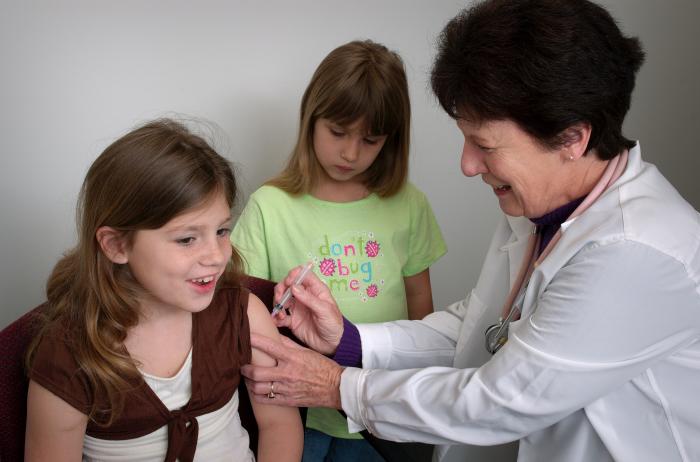
Girls and boys ages 11 and 12 now need just two doses of the HPV vaccine, says the CDC. PHOTO BY JAMES GATHANY/CDC
The University of Southern California (USC) Norris Comprehensive Cancer Center and its fellow 69 National Cancer Institute (NCI)-designated cancer centers voiced their support last week for recently revised recommendations from the Centers for Disease Control and Prevention (CDC) for the human papillomavirus (HPV) vaccine. These guidelines recommend that children ages 11 and 12 should receive two doses – rather than the previously recommended three – of the HPV vaccine. Adolescents and young adults older than 15 should continue to complete the three-dose series.
“The updated guidelines provide a safe and effective way for parents to protect their children from easily preventable cancers,” said Stephen Gruber, MD, PhD, MPH, director of the USC Norris Comprehensive Cancer Center, in a statement announcing the center’s support. “Our hope is that this will encourage more parents to vaccinate their children against HPV, which would dramatically decrease the incidence rates for cervical cancer, as well as other cancers that affect both men and women.”
According to the CDC, incidence rates of HPV-associated cancers have continued to rise, with approximately 39,000 new HPV-associated cancers now diagnosed each year in the U.S. Although HPV vaccines can prevent the majority of cervical, anal, oropharyngeal (middle throat) and other genital cancers, vaccination rates remain low across the U.S., with just 41.9 percent of girls and 28.1 percent of boys completing the recommend vaccine series.
Research shows there are a number of barriers to overcome to improve vaccination rates, including a lack of strong recommendations from physicians and parents not understanding that this vaccine protects against several types of cancer.
“Physicians and researchers must educate parents and the public about the importance of vaccinating children and adolescents against HPV,” Gruber said. “With this vaccine, we have the ability to eradicate cervical cancer and other cancers, and our advocacy is crucial for increasing vaccination rates nationwide.”
In an effort to overcome these barriers, NCI-designated cancer centers have organized a continuing series of national summits to share new research, discuss best practices, and identify collective action toward improving vaccination rates.
“We have been inspired by the White House Cancer Moonshot to work together in eliminating cancer,” said Electra Paskett, PhD, associate director for population sciences at The Ohio State University Comprehensive Cancer Center – Arthur G. James Cancer Hospital and Richard J. Solove Research Institute (OSUCCC – James) Cancer Control Research Program. “Improving HPV vaccination is an example of an evidence-based prevention strategy we can implement today to save thousands of lives in the future.”
The statement supporting the new CDC recommendation follows a gathering this past summer of 150 experts from across the country, including Gruber and other USC Norris faculty, to present research updates and plan future collaborative actions across NCI-designated cancer centers.

























